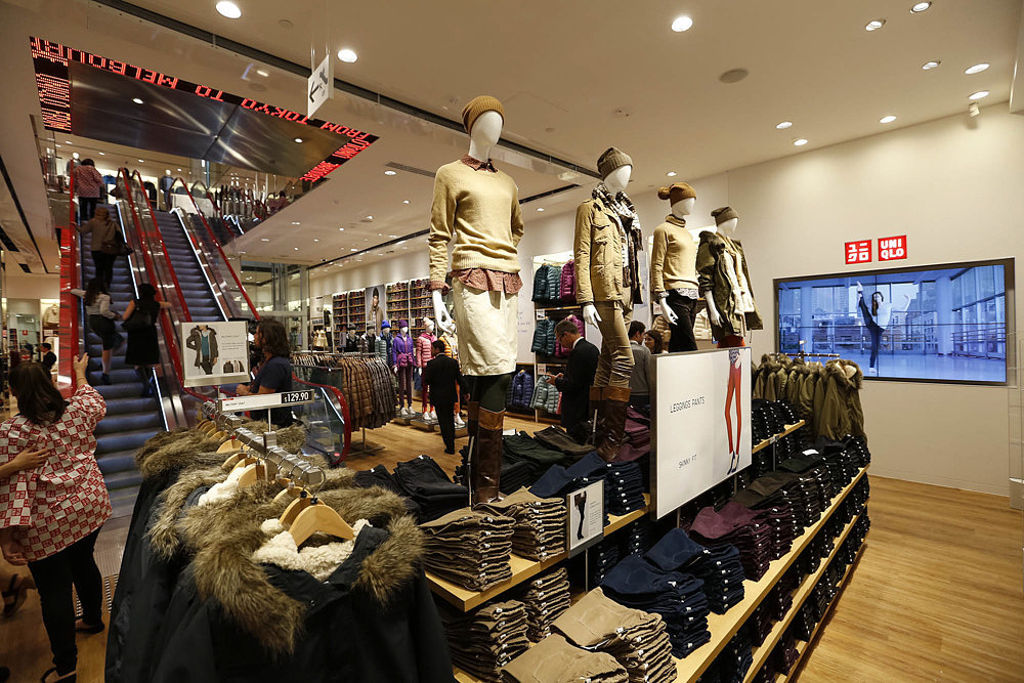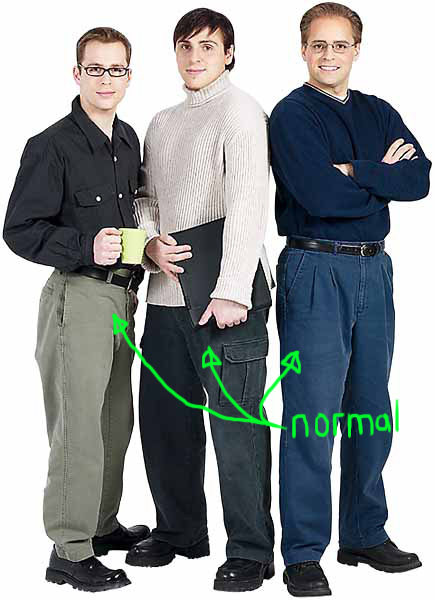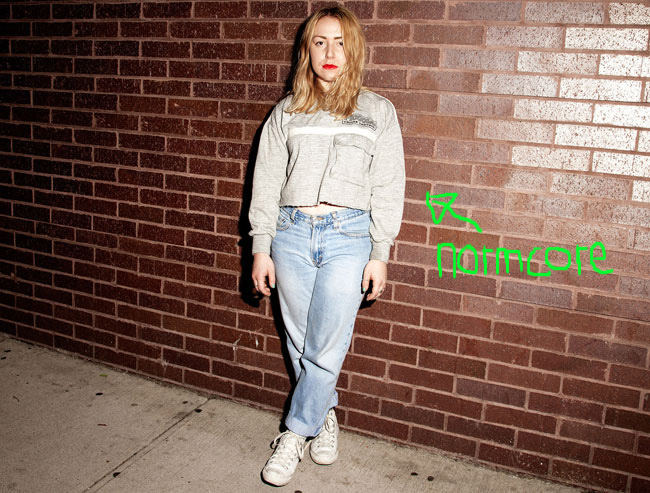Normcore Was Always Silly, But Now It’s Meaningless Too
Normcore will be both ubiquitous and utterly meaningless by 2015: people will just go on wearing what they’ve always worn, but now we have a stupid new name for it.

I know, I know, we agreed that we’d hold hands, hum loudly and ignore normcore forever. Don’t worry, though: I’m not here to gush, or to give you a primer on something that doesn’t matter, never really did, and will hopefully go the way of the Chia Pet.
I’m here to talk about language, commerce, and fashion’s truly stellar ability to eat its own (admittedly infuriating) babies.
Almost three months into its wretched life cycle, and “normcore” – a new hip movement towards “self-aware, stylized blandless” which was invented in one of those insufferable NY Mag trend pieces in February — still hasn’t collapsed under the weight of its own smugness. What’s more, Japanese mid-range clothing giant Uniqlo is currently trying to take this thing, which was just a dumb thing, and use it to describe the thing that they are — even though they’re not that thing, and they shouldn’t aspire to be that thing, either.
And now a word that meant something silly teeters on the edge of meaning nothing at all – a long-awaited pretender to the tired, musty throne of ‘hipster’.
Please Can You Explain Normcore To Me First?
Well, it’d be easier just to read this, but just quickly: normcore is essentially the idea of pursuing radical, aggressive blandness in fashion: polar fleece, relaxed-fit chinos, that sort of thing.


In a sense, it’s about blending in, but blending in with the sort of people that a gorgeous young fashionista would never be mistaken for, while standing out from those that one must never be mistaken for: the young and fairly-fashionable crowd.
Normcore celebrates the con at the heart of fashion: that a shirt can’t make you a better lover – all a shirt really does is cover your torso. Normcore positively drips with irony, right onto your shirt. Lucky you were wearing a shirt.
Just a shirt.
–
Is Normcore Just The Revenge Of The ’90s?
Drool-covered shirt aside, the above definition is the broadly accepted narrative — but what if all of this was just another ‘90s revival, mis-branded as some postmodern pantomime? The funny thing about ’90s fashion is that it was in parts so bland that a decent proportion of its exponents never really felt the need to disown their youthful decisions, a la flares and poodle perms.
I found this out first-hand about a year ago, when I attended a Seinfeld-themed party. Or so I thought. It turns out that the friend who told me about the theme was playing a (very mild) prank on me, and I was one of only three people in costume. I felt pretty dumb, but not a single attendee realised that there was anything odd about my combination of sneakers and a generic shirt, tucked into easy-fit jeans.
There I found myself, an accidental ‘90s revivalist, going unnoticed among the children of the ‘90s, all of us looking a little bland together.
–
Is Normcore Just About Feeling Special While Accepting That You’re Not Special At All?
Let’s assume that there is a little more at play here, something that might explain the normcore meme’s remarkable popularity. At the heart of the human condition lies two powerful, contradictory urges: the ego-driven urge to stand out, and the socially-determined need to fit in. This delicate balance informs all social subdivisions, from high school cliques and sporting fandom to entire nation states. Combine these urges with the hegemonic practice of constructing the self through consumption and the mechanisms of global commerce, and you have fashion.
The cool/not cool binary is bad business, as there are a lot more uncool people than cool people, and it makes far more commercial sense to flatter the consumer and validate their choices. This is, at least in some small part, why the notion of “cool” has been completely atomised, to the point that a rejection of cool, such as normcore, is better understood as an articulation of an alternate idea of cool – and why we now have a ridiculous proliferation of alternate understandings of what cool is. There’s the earnest, sincere pursuit of a traditional notion of uncool (geek chic); the earnest, sincere pursuit of a non-traditional notion of cool (the dreaded hipster); and some flat-out weird shit that doesn’t make any sense at all (seapunk).
In fact, just about the only thing that is not cool is the alternative to those alternatives: a traditional, James Dean alpha-rebel-in-leather – and even that can be appropriated in an ironic way, and often is.
Normcore is really just a refinement of the idea behind geek-chic, and proof that there is no such thing as cool: instead, there are just the audiences that you want to impress, and the ones you want to alienate.
If fashion is like a nightclub that claims to be exclusive despite having no bouncer, normcore is that same club, but with all of the signage removed.
The Inherent Ludicrousness Of Appropriating A Parody
The Gap, and more recently Uniqlo, have now appropriated the term with a seemingly sincere lack of awareness of the fact that the entire point of “normcore” is to erect a forcefield between such purveyors of monolithic mediocrity and the true cultural elite.
What’s more, they embarrass themselves for no good reason. Giant, multinational retailers such as Gap and Uniqlo will always be fashionable, in the sense that when taken in aggregation, the styles that they carry dictate what our lives look like. At the same time, though, they will never be fashionable, in the sense that they will never be embraced by those who derive their sense of self from being above, beyond, ahead of the mainstream fashion pack.
In short, they’re making arses of themselves by appropriating a term that takes the piss clean out of them.
It’s a catchphrase, though, and catchphrases are doomed to be repurposed by people more excited by the prospect of using the term than understanding what it means. Now that it’s started happening, you can rest assured that normcore will be both ubiquitous and utterly meaningless by year’s end: people will just go on wearing what they’ve always worn, but now we have a stupid new name for it.
The End Of ‘Hipster’; The Start Of Something Weird
Normcore is the logical, and ridiculous, endpoint of fashion, its core paradox reduced to a language game: if you don’t know how or why I’m being fashionable, then you can’t copy me, thus preserving my status.
If Uniqlo want to be a part of this, then good for them, but it’s the first step towards a complete abstraction of the very idea of fashion: a postmodern weirdness where no article of clothing simply is what it is, but is loaded with a multitude of signifiers that define the unwitting wearer in an endless multitude of ways.
If there’s one potentially positive outcome, it’s that it might herald the end of ‘hipster’ as the pejorative you use when someone just like you differs from you in one crucial way that makes them insufferable and without merit.
So, um, ‘yay’, I guess?
–
Edward Sharp-Paul is a writer from Melbourne. His words can be found at FasterLouder, Mess+Noise, Beat and The Brag, or on Twitter: @e_sharppaul.


